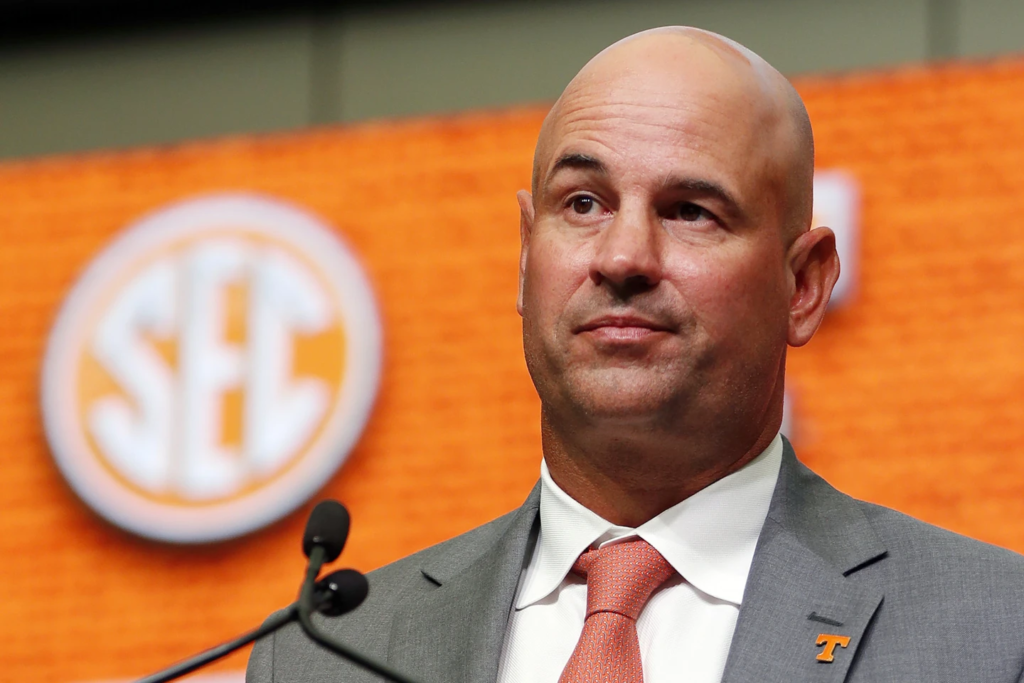In Knoxville, Tennessee, the NCAA handed down a hefty fine of over $8 million to the University on Friday. The stern report, spanning 80 pages, unveiled a shocking revelation of more than 200 infractions that occurred during the three-year period when Jeremy Pruitt served as the head football coach. Despite the severity of the violations, the Volunteers managed to avoid a postseason ban.
The comprehensive report pointed out a staggering 18 Level I violations, which are considered the most serious offenses. These infractions primarily centered around recruiting misconduct and direct payments made to athletes and their families, amounting to approximately $60,000 in benefits.
Kay Norton, who led the panel responsible for passing judgment on Tennessee, did not mince words, describing the violations as “egregious and expansive.”
“It’s one of the largest cases this committee has ever adjudicated,” stated Kay Norton, referring to the scale of the NCAA investigation on Tennessee’s infractions.
Despite the seriousness of the violations, the NCAA commended Tennessee for its cooperation, leading to the Vols escaping a postseason ban. However, the infractions panel acknowledged that arriving at this decision was challenging, considering the circumstances surrounding the case.
In their ruling, the panel highlighted the need for clearer and more defined penalty guidelines beyond just postseason bans. They urged the Infractions Process Committee and the NCAA membership to establish a philosophy on penalties and solidify it in updated guidelines.
As a result of the investigation, four former staff members, including Jeremy Pruitt, faced show-cause orders. Pruitt received a particularly lengthy show-cause order lasting six years, stemming from his involvement in the violations, which ultimately led to his termination in early 2021.
The NCAA report also criticized the University for its failure to properly monitor its football program, and it pointed out that Pruitt, as the former head coach, violated head coach responsibility rules due to his personal involvement in the infractions.
Donde Plowman, the Chancellor of the University of Tennessee, expressed the school’s recognition of the severity of the wrongdoing and asserted that the case was resolved with integrity.
In response to the NCAA’s decision, University officials expressed relief that the Committee did not impose a postseason ban, as they had been advocating against such a penalty throughout the entire process.
The NCAA investigation revealed that a significant portion of the violations stemmed from a paid unofficial visit scheme, which the football program consistently employed for a period of two years. At least twelve members of the football staff were involved, leading to numerous infractions, including 110 impermissible hotel room nights, 180 impermissible meals, 72 instances of providing impermissible entertainment or other benefits, 41 impermissible recruiting contacts, 37 instances of providing impermissible game day parking, and 14 occasions of impermissibly providing gear to prospects.
Moreover, the NCAA discovered that Jeremy Pruitt, the former head coach, and his wife were directly involved in making impermissible payments to two prospects who eventually signed with Tennessee. In one instance, Pruitt’s wife provided the mother of a player with $6,000 as a down payment for a car. After the player joined the Vols, she continued to pay the mother $500 per month for car payments, totaling at least 25 payments. Additionally, the player’s mother received $1,600 from Pruitt’s wife to cover a deposit for a rental home in the Knoxville area.
In another case, the mother of a different prospect informed Pruitt that she needed financial assistance for a medical procedure she couldn’t afford. The NCAA’s findings revealed that Pruitt gave her an envelope containing $3,000 to cover the medical bills. Bank records indicated that two days after $5,000 was withdrawn from the head coach’s bank account, the prospect’s mother deposited $5,100 into her own account.
These findings painted a concerning picture of the football program’s activities, leading to significant repercussions for both the former coaching staff and the University.
In addition to the previous infractions, it was discovered that Jeremy Pruitt provided the woman with an additional $300 to cover gas expenses. Both players involved in the impermissible payments competed in 23 games while ineligible, according to the NCAA’s findings.
The NCAA panel expressed serious concern about the overall culture within the football program during Pruitt’s tenure. It noted that he and other members of his staff displayed a general and blatant disregard for rules compliance. A troubling aspect emerged when a former staff member admitted that she failed to report violations due to fear of retaliation and backlash, highlighting the toxic environment that existed under Pruitt’s leadership.
Kay Norton acknowledged that the University’s cooperation played a crucial role in avoiding a postseason ban. Had Tennessee not cooperated, a postseason ban would have been one of the penalties available to the committee.
Norton emphasized that the violations were primarily related to recruiting and that they showcased a clear unwillingness to even pretend to abide by the rules. This lack of adherence to NCAA regulations and the magnitude of infractions led to severe consequences for the University and its football program.
The NCAA’s final decision marks the conclusion of a troublesome chapter in the history of Vols football. Jeremy Pruitt’s dismissal as head coach provided an opportunity for Tennessee’s resurgence under his replacement, Josh Heupel. Over the past three seasons, Heupel has guided the team to an impressive 18-8 record, including a remarkable victory over the Southeastern Conference powerhouse, Alabama, last year. With a renewed sense of leadership and success on the field, Tennessee’s football program appears to be on a path of revival and rejuvenation under Heupel’s guidance.


